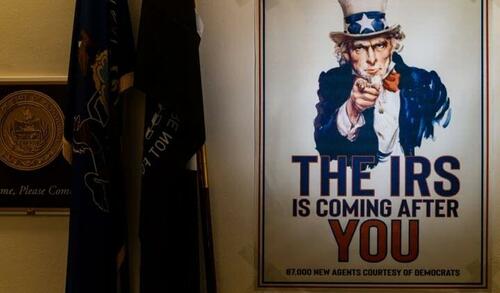Authored by Tom Ozimek through The Date Times,
The Irs (INTERNAL REVENUE SERVICE) prepares to increase its hiring of tax enforcers in coming months, the firm’s chief has actually exposed, putting taxpayers on greater alert as the internal revenue service reinforces the ranks of its enforcement army.
internal revenue service commissioner Danny Werfel made the remarks on the sidelines of the Association for Federal Business Threat Management’s (AFERM) yearly top on Nov. 28.
In a keynote speech at the occasion, Mr. Werfel stated he’s “meticulously positive” that the internal revenue service can tap the $60 billion or two in additional federal financing to improve its out-of-date IT systems, boost staff member training, and normally restore its capabilities.
However in an interview with the Federal News Network after his speech, Mr. Werfel exposed that it’s been a “extremely hectic fall” when it concerns the firm’s recruitment efforts– which he intends to reinforce the ranks of the internal revenue service’ tax enforcement representatives.
” I would anticipate hiring activity on the enforcement side to increase as we participate in 2024,” Mr. Werfel informed the outlet.
‘ Army’ of Tax Enforcers?
While Mr. Werfel didn’t define what sort of working with numbers he’s targeting, the internal revenue service stated in mid-September that it was fast-tracking the hiring of 3,700 individuals to help with “broadened enforcement work” that is implied to concentrate on complicated collaborations, huge corporations, and high-income earners.
The tax enforcement positions will be open in more than 250 places throughout the United States, and they belong to what the internal revenue service has actually assured would be a “sweeping, historical” tax enforcement crackdown that leverages innovative innovation, consisting of expert system, to capture tax evaders better.
Republicans have actually cautioned that the internal revenue service’ $60 billion money infusion from the Inflation Decrease Act would be utilized to work with an “army” of 87,00 tax enforcers whose work would cause a boost in the rate of tax audits targeting normal Americans.
While Mr. Werfel, President Joe Biden, Treasury Secretary Janet Yellen, and others in the administration have all assured that the internal revenue service’ improved enforcement work would target corporations and high-income people (which the tax audit rates would not increase for Americans making less than $400,000 each year), a guard dog has actually called into question this promise.
The Treasury Inspector General for Tax Administration (TIGTA), which is the guard dog managing the internal revenue service, stated in a current report that the tax firm might wind up (maybe accidentally) breaking its guarantee not to target normal Americans since the internal revenue service does not have a clear meaning of “high earnings.”
” The high-income terms is being utilized loosely inside the internal revenue service without any typical understanding of what the term indicates,” the guard dog stated.
TIGTA discussed that the internal revenue service continues to depend on old tax evaluation activity codes embraced half a century earlier with the Tax Reform Act of 1976, which utilized a $200,000 limit to determine high-income returns.
Presently, “there is no other way to recognize the total population of taxpayers that satisfy the requirement of $400,000 or more defined by the existing Treasury Secretary,” the guard dog stated in its report, alerting that the internal revenue service’ tax enforcers might wind up casting their internet more commonly than its primary assured.
” When the high-income limits are set too low, the outcome can be greater varieties of ineffective evaluations,” the guard dog stated. “When the meaning is too low, the base of taxpayers making those earnings is broader so that the internal revenue service does much more audits because classification in order to attain preferred audit protection.”
Internal Revenue Service Employing Levels
Employing at the internal revenue service has actually increased by over 13 percent over the previous year as the variety of staff members at the firm has actually reached a level not seen in over a years.
Mr. Werfel informed press reporters this summertime that the internal revenue service was close to reaching 90,000 full-time staff members.
The firm used 79,070 full-time comparable positions in 2022, according to the internal revenue service’ 2022 Data Book A boost in staffing levels to 90,000 employees represents a 13.79 percent boost in approximately a year.
The last time the internal revenue service used more than 90,000 individuals was 2012 when the firm had 90,280 full-time comparable positions.
Staffing dipped listed below 80,000 in 2015 and stayed listed below that level previously.
Not just is the internal revenue service wanting to reinforce the ranks of its tax enforcers, it’s likewise wanting to work with more armed representatives for its criminal examinations department.
Called “gun-toters,” the armed unique representatives in the internal revenue service Lawbreaker Examinations (IRS-CI) system are accountable for imposing those parts of the tax code whose offenses total up to criminal offenses.
Mr. Werfel informed legislators at an April 27 hearing of your home Ways and Method Committee that the IRS-CI department would work with an approximated 360 brand-new armed representatives each year over the next 5 years for a net gain of 1,200 after attrition due to resignation and retirement.
The internal revenue service chief firmly insisted, nevertheless, that the extra hires would not be utilized to increase the variety of tax audits.
Presently, the IRS-CI department has around 2,100 armed representatives. In the mid-1990s, the system had around 3,500 unique representatives. Carissa Cutrell, a public affairs officer at the firm, informed The Date Times in an earlier declaration that IRS-CI loses in between 150 and 175 representatives each year due to retirement and attrition.
Filling …
